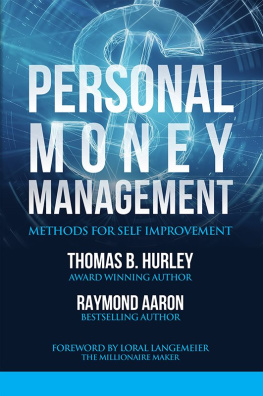
Information provided is from the authors perspective. The author assumes no responsibility for your financial success or failure.
No part of this book may be reproduced or transmitted in any form or by any meansexcept by a reviewer who may quote passages in a reviewwithout permission from the author. For information, please contact
Copyright 2016 Simple Strategic Solutions LLC
All Rights Reserved
ISBN-10: 1481027565
ISBN-13: 9781481027564
Library of Congress Control Number: 2012922006
CreateSpace Independent Publishing Platform
North Charleston, SC
A Gift to My Children
Sam, Sabrina, Julia, Jack, and Luke: I hope the wisdom you gain from this book will allow you to avoid the financial pitfalls of my generation.
Caveat to All
Understand this is one mans perspective that he is giving to his children. It worked for me in my early years and works for me now as I am firmly entrenched in middle age. Hopefully, it will help others think about their own personal money management. As young adults mature, so should their money management skills.
CONTENTS
FOREWORD
Although I was fortunate to attend an exceptional high school, college, and business school, none of these schools provided me with even a cursory understanding of personal money management.
This is amazing considering I attended one of the top business schools in the country and graduated with a finance concentration. Thus, nothing you will read in this book comes from a textbook. It comes from experiences Ive had and events Ive witnessed over time.
It still amazes me that high schools and colleges dont make personal money management courses mandatory. Young adults go out into the world as versed in this area as they were when they were infants. Yet, being able to manage your personal finances is essential to the long-term success of anyone entering any occupation. More importantly, it is essential to managing ones everyday life.
My hope is that I provide young adults (and older adults) with the principles that will allow them to live prosperous lives by making good, sound personal financial decisions.
LIFE
LESSON
Principle 1
MARRY THE FINANCIALLY RIGHT PERSON
When I say this, I dont mean marry a financial genius or someone who is wealthy. Marry someone who has good financial habits. This personal quality is often ignored during the courting process. In fact, you are usually trying to impress the opposite sex with expensive dinners, extravagant dates, and impressive presents.
If you cant afford something when youre dating, you most likely wont be able to afford it when youre married. Show your partner who you really are financially, and make sure he or she shows you who he or she is before marriage. Dont surprise your partner by changing your financial habits when youre married (and ask the same of your spouse). At that point, it will cause significant issues. Money is one of the biggest things couples fight about.
Talk about your money philosophy. Are you a saver? Is she a spender? Do you believe in debt? Do you want to own a home? What are your assets? What is her salary? Does she owe money? What are the credit histories and credit scores for both of you? Does she have a budget and adhere to it?
These are easy questions to answer but not so easy to ask. They are so important, though. You need to have full disclosure of your past, present, and future financial lives. You will learn not only a lot about your potential future spouse but quite a bit about yourself.
Principle 2
STAY MARRIED TO THE FINANCIALLY RIGHT PERSON
The quickest way to a financial downfall is divorce. Think about it: Besides the emotional turmoil, at best you split your money in half. At worst, you lose almost all of it through legal fees, administrative costs, excess living costs, alimony, and child support.
I always tell my wife that staying married to her is the main reason I was able to retire at age forty-five. Sure, I did well in business and followed my principles of money management. However, thousands of executives who made more money than I still have to work to support their third or fourth family. Be happy with what you have. The grass is rarely greener on the other side.
Do your homework with . Make sure your spouse is frugal, shares the same money philosophy as you, and understands that marriage is forever. Have honest discussions about your financial life throughout your marriage. By this, I mean write down and talk about your monthly budget, net worth, financial problems, opportunities, and future financial goals. These need to be ongoing discussionsnot once a year, but monthly or more often.
This thought process will extend to other aspects of your marriage. If you do this, youll be setting yourself up not only for financial success but also for an open, honest marriage.
Principle 3
HAVING AND RAISING CHILDREN COSTS LOTS OF MONEY
First, let me say that I love children. Given that I have five of them, it should be obvious. However, I also have to say that the cost of raising them continues to surprise me. Its very difficult to say no to your children. You want them to be happy, and happiness usually means that they get stuff.
When you add up the cost of raising kids, the obvious expenditures come to mind: education, childcare, healthcare, food, and clothing. However, dont forget to include things like a larger house, larger car, higher utility bills, entertainment, sports, and other activities they will participate in during their childhood.
The cost of having and raising a child is anywhere between $200,000 and $250,000 (before college expenses), depending on your income level and spending habits. Thats a huge expenditure for anyone!
Ultimately, you will spend more money on them than on yourself.
You cant be selfish (monetarily or otherwise) if you are going to have children. More importantly, you need to fully understand the long-term financial (and lifestyle) tradeoffs of your decision. In financial terms, children are a significant expense that you and your spouse need to consider prior to starting a family.
I know it sounds cold to look at children this way, and very few people do so. Once youve done this and decide to have children, focus on loving them, and everything will work out from there.
Principle 4
ALWAYS LIVE BELOW YOUR MEANS
If you want to manage your money successfully, this is one of the most important principles to follow. And this is where most Americans have gone, and will continue to go wrong. People want to have everythingnow. They just cant wait until they can afford it.
Wait until you can afford something before you buy it. It will feel better when you get it. If you continue to purchase things you cant afford, you will be on a downward spiral that will continue until you go bankrupt.
If you always live below your means, you will always have extra money to save and invest. Over the years, your money will continue to grow, and ultimately you will find yourself with significant financial security.
Keep in mind that living below your means doesnt mean living badly. It means you need to prioritize your spending and focus on what is most important to you. It means living smartly.
Principle 5
TAKE CARE OF YOUR STUFF
Your parents told you this when you were growing up, and many of you probably blew it off because you may not have been paying for your stuff.
Next page










